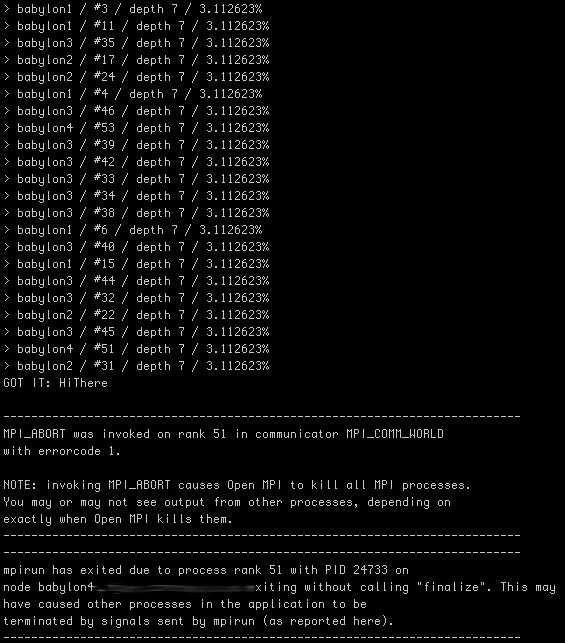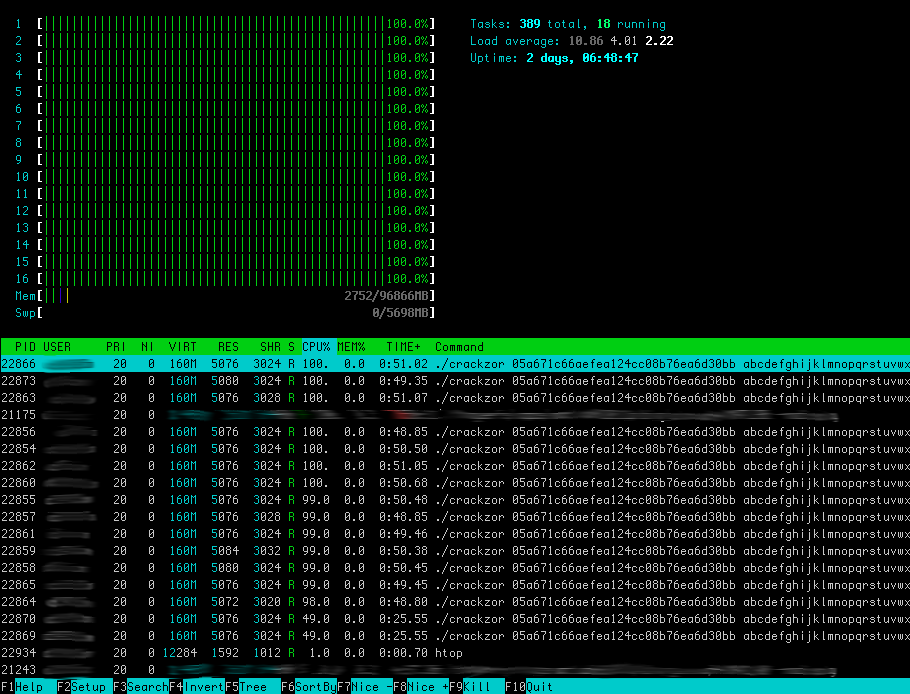Download
Previous versions:
Quick start
- Download & extract with “tar zxvf crackzor_1.0.tar.gz”
- Make sure you have the right packages in place
sudo apt-get install build-essential libopenmpi-dev openmpi-bin libssl-dev
- Compile with
mpicc -O3 crackzor.c -o crackzor -lm -lssl -lcrypto
- Create a file called “machines” containing a newline separated list of every machine that are in your cluster, for example:
machine00.domain.com machine01.domain.com machine02.domain.com machine03.domain.com machine04.domain.com
- Open MPI uses SSH for communication between nodes, as such, you need to make sure that the node you will be launching crakzor from is able to do SSH key based authentication to all the other nodes in the cluster. For my example above, if machine00 is where you will be working from, you will want to
ssh-copy-id machine0X.domain.com
where X E [0,4] (yes, machine00 needs to be able to SSH to itself).
- You now need to disseminate your executable across all the machines that will be running it:
for machine in `cat machines`; do scp crackzor $machine:~; done
Pro-tip: having network storage attached to all the machines makes this step unnecessary.
- Run with:
mpirun -npernode Y -machinefile machines crackzor fbade9e36a3f36d3d676c1b808451dd7 abcdefghijklmnopqrstuvwxzy 1 1
where Y is the number of cores each machine in your cluster has. If you are running this on machines with 2 CPUs with 8 cores each, Y = 8 * 2 = 16.
Tested on Ubuntu 10.04 64b / Ubuntu 12.04 64b / Ubuntu 14.04 64b
Screenshots
mpirun -npernode 16 -machinefile machines ./crackzor 7ca4793dcdff46ecda38e48d65b6c913 abcdefghijklmnopqrstuvwxzyABCDEFGHIJKLMNOPQRSTUVWXYZ 1 7
This is what “htop” looks like with a bunch of processes spawned & hammering every core:
Statistics
For the purpose of testing crackzor, we give it the md5 hash of an 8 character word and tell it to bruteforce it up to 7 characters. This insures that we will compute every permutation up to 7 character longs. The characters I asked it to permute are “abcdefghijklmnopqrstuvwxzyABCDEFGHIJKLMNOPQRSTUVWXYZ”, our sample space size is thus 52^7 + 52^6 + 52^5 + 52^4 + 52^3 + 52^2 + 52^1 = 1,048,229,971,204.
Here is the raw data, and here it is graphed:

 I wish it would show the linear progression more but 3 things got in the way:
I wish it would show the linear progression more but 3 things got in the way:
- approaching the machine’s actual number of cores on the Dell blades leaves little room for linear expansion
- which is emphasized in a multiuser environment where other users run other computation
- the EC2 bar flattens the graph a bit but I still wanted to show how it compares
Ideally I would run through a few iterations of EC2 to observe its progression but hey, it’s expensive :).
Limitations
- Right now, the only hashing algorithm supported by crackzor is MD5. It can very easily be expanded upon.
- I also may not be using the fastest MD5 method with the fastest call, distribution is what I’m interested in.
- Distributing password cracking among multiple machines is throwing linear resources to an exponential problem!


One Reply to “OpenMPI distributed password cracker: crackzor”